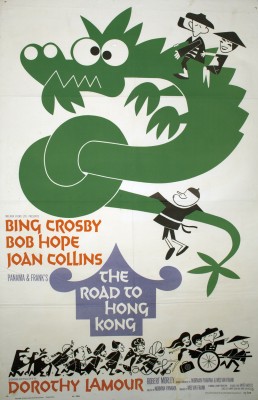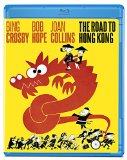| Reviews & Columns |
|
Reviews DVD TV on DVD Blu-ray 4K UHD International DVDs In Theaters Reviews by Studio Video Games Features Collector Series DVDs Easter Egg Database Interviews DVD Talk Radio Feature Articles Columns Anime Talk DVD Savant Horror DVDs The M.O.D. Squad Art House HD Talk Silent DVD
|
DVD Talk Forum |
|
|
| Resources |
|
DVD Price Search Customer Service #'s RCE Info Links |
|
Columns
|
|
|
Road to Hong Kong, The
This last Road movie doesn't get a lot of love. Reviews then and now invariably point to the fact that Hope and Crosby were each pushing 60 and, so they claim, well past their sell-by date. But that's a nonsensical complaint. The humor found in the Road pictures always consisted mainly of verbal patter and visual sight gags. What physical slapstick there was, from the earliest Road movies, was performed by professional stunt men, rarely Hope or Crosby themselves.
Moreover, Hope and Crosby were still trim and fit and full of obvious energy. They sing and dance, run around a lot over the course of the film, and their comedy timing is as impeccable as ever. Consider The Three Stooges in Orbit, released that same year. Moe was six years older than Hope and Crosby (born a few weeks apart, in May 1903), but Larry was about the same age and Curly-Joe (DeRita) was several years younger. The Stooges in that film look awfully old and tired, and their comedy is pretty lethargic. Compared to the Stooges, Hope and Crosby look ready to run in a marathon. (A wanted flyer in Hong Kong claims both men were born in 1921, making them 40 when the movie was made. Ha!)
Some of this griping about their ages may be the result of what happened to series regular Dorothy Lamour. She was unceremoniously demoted from leading lady to guest star. Supposedly Bing thought the 48-year-old too old for role essayed instead by Joan Collins. Hope, more loyal than Bing, reportedly insisted that she be in the picture anyway, hence her prominent appearance late in the film, performing in a Hong Kong nightclub.
Regardless, the movie is better than its reputation. About a decade ago I ran all of the Road movies in chronological order, spaced about a week apart. I was rather surprised to find that most hadn't aged well, with the first two, Singapore and Zanzibar being particularly weak. Road to Utopia and Road to Bali are the best ones, though The Road to Hong Kong ranks a respectable third, followed by Morocco (not as good as I remembered it), Rio, then Zanzibar, and Singapore.
Olive Films' new Blu-ray of The Road to Hong Kong looks great, far superior to MGM's long-ago DVD version. The black-and-white film is clean and super-sharp for the most part, while the disc includes an original trailer.
Harry Turner (Bing) and Chester Babcock (Bob) are hucksters selling stock in their phony invention, a "Do It Yourself Interplanetary Flight Kit," in far-flung Calcutta. When their stooge fails to show up to "demonstrate" the device, Harry sweet-talks Chester into taking the man's place: "Don't I always get you the best medical attention available?" asks Harry. (The scene also has Chester recalling previous Road movies: "That's what'cha said when you shot me out of a cannon, when you dropped me in a tank with an octopus, when you had me wrestle a gorilla.")
Chester, naturally, winds up in the hospital, physically okay but suffering from amnesia. Harry takes him to a crackpot Indian doctor (an uncredited Peter Sellers), who in turn refers them to a lamasery in Tibet (played by the matte painting from Black Narcissus). En route, Diane (Joan Collins), an agent for the SPECTRE-like "Third Echelon" and mistaking Chester for a fellow spy, unwittingly slips into his pocket a stolen Russian rocket formula.
In Tibet, Chester's amnesia is cured, and as a kind of bonus treatment, he's given tea leaves that temporarily give him a photographic memory. (Harry calls Chester "a slope-nosed UNIVAC.") Thinking they've stumbled upon a great new memory act, they test it on the rocket fuel, unaware of its importance. Upon returning to Calcutta, Diane secretly negotiates with Harry to have Chester recite the formula at the Third Echelon's high-tech lair in Hong Kong, Harry telling Chester that he's booked an audition there for a $2,500 stint. Later, the Third Echelon's monomaniacal leader (Robert Morley) sends Harry and Chester into outer space - twice!
The fast and funny script by Norman Panama and Melvin Frank, who directed and produced, respectively, and also wrote Road to Utopia, hits all the familiar Road movie notes. Some gags break the fourth wall, with Harry or Chester directly addressing the audience*, and there are innumerable in-jokes, surreal sight gags, and surprise cameo appearances. They call on "special effects" to get them out of a jam, or play "patty-cake," a cue to start throwing synchronized punches. And, as usual, melodious schemer Bing is forever selling out patsy pal Bob for a buck or a dame.
Filmed in England, The Road to Hong Kong oddly resembles both their Paramount films of the forties and early-fifties and a typical early-sixties British comedy of the type that would feature actors like Sellers and Morley. Syd Cain's expensive-looking sets are elaborate and evocative, comical in appearance yet just believable enough to be plausible. Many supposedly "serious" sci-fi thrillers from the period would kill to have sets this good. (One brief scene has Harry and Chester replacing ape-o-nauts, human extras wearing very elaborate masks that are glimpsed only fleetingly.)
The movie is often misidentified as a spoof of ‘60s spy films, but that sub-genre wouldn't kick into high gear until late 1965. The story coincidentally shares some similarities with Dr. No, but the movie of that, the first James Bond movie, wasn't released until the fall of '62. Road to Hong Kong came first, in March, and probably in the can well before that considering its 1961 copyright notice.
While other reviewers claim the film was out-of-step with newer comic sensibilities, Panama and Frank, as well as Hope and Crosby, strike a nice balance between what had worked so well before with some new ideas. The picture reflects the profound current interest in spaceflight (the Mercury Program was in full swing at the time) more than the spy stuff, and there are more suggestive jokes they probably couldn't have gotten away with a decade before. Peter Sellers, hilarious as the befuddled Indian doctor, generously is allowed to completely steal the scene from the two stars, who clearly seem to appreciate Sellers's talent. One unconfirmed rumor suggests Bing was particularly savvy in this regard: reportedly he wanted members of Monty Python to write The Road to the Fountain of Youth, a final Road movie shelved after Bing died in 1977.
Video & Audio
Olive's HD master of The Road to Hong Kong, in 1.66:1 widescreen, for the most part looks great. Solid blacks and enough sharpness that it's easy to see the wires manipulated for various sight gags. The DTS-HD Master Audio mono (with no other language options or subtitles) is likewise strong.
Extra Features
The lone supplement is a high-def trailer, complete with text and narration. Sellers must have contracted to appear in the film unbilled, but that didn't stop United Artists from prominently sticking part of his scene in the trailer without actually identifying him.
Parting Thoughts
Great fun, and much better than its reputation, The Road to Hong Kong was really the last good starring comedy either of them made. It's loaded with laughs and looks great on Blu-ray. Highly Recommended.
* My favorite gag of the entire Road series occurs in Road to Bali. Hope and Crosby are stranded on some South Seas island when bandleader Bob Crosby walks into frame next to Bing, raises a rifle, fires it, and walks off. Bing explains: "That was my brother Bob. I promised him a shot in my next picture."
Stuart Galbraith IV is the Kyoto-based film historian and publisher-editor of World Cinema Paradise. His credits include film history books, DVD and Blu-ray audio commentaries and special features.
|
| Popular Reviews |
| Sponsored Links |
|
|
| Sponsored Links |
|
|
| Release List | Reviews | Shop | Newsletter | Forum | DVD Giveaways | Blu-Ray | Advertise |
|
Copyright 2024 DVDTalk.com All Rights Reserved. Legal Info, Privacy Policy, Terms of Use,
Manage Preferences,
Your Privacy Choices | |||||||















